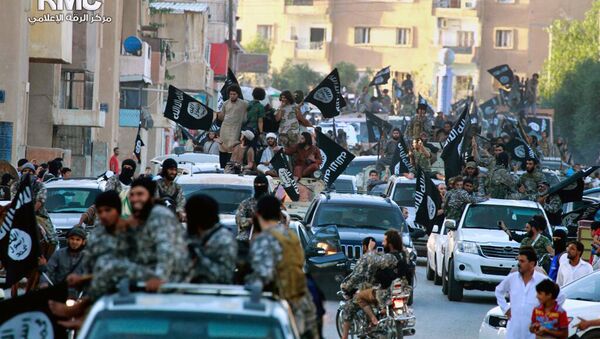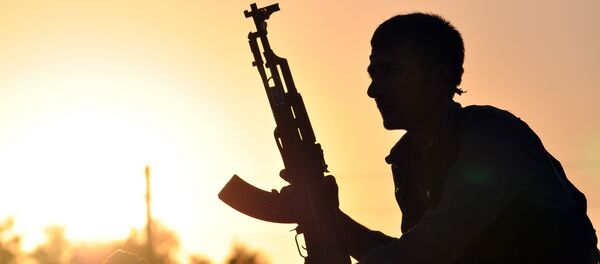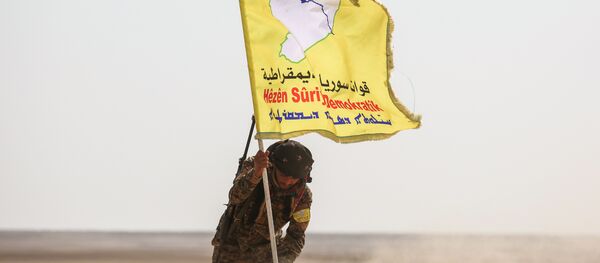"The ultimate goal is to cleanse a 5,000-square-km area," Erdogan told a news conference before his departure on an official visit to Bahrain, Saudi Arabia and Qatar.
He said Turkish forces had no intention of staying in Syria once the area had been cleared of both Daesh and Kurdish YPG militia fighters, whom Turkey sees as a hostile force.
However many experts noted that questions remain over how Turkish-backed forces will liberate the city, as US-backed Kurdish YPG units (Kurdish People's Protection Units, also known as the People's Defense Units or YPG) are already on their way to Raqqa.
According to the Turkish Daily Sabah, despite the promise of President Erdogan, "the situation on the ground is much more complicated than on paper."
The YPG, it notes, has received "significant backing from the United States. The Obama administration provided arms, weapons and ammunition to the YPG as well as aerial support. US support for the YPG played a crucial role in the group's advance toward Raqqa."
While Ankara seeks to move on to Raqqa and liberate the city from Daesh, the YPG could be on its way to the city center shortly, it notes.
"Amid Ankara's assertive approach to capture Raqqa, questions loom about how a Turkish-backed offensive could be launched if the YPG is already there," it further questions.
"Turkey has submitted its plan for the future of Syria's northern territories to the US-led coalition," he told RT.
"The representatives of the US Central Command (CENTCOM) have recently admitted that they have received certain suggestions from the Turks, which however did not satisfy all the members of the coalition," he added.
The expert also commented on recent reports that the administration of the new US president has turned down the plan of the previous administration for the liberation of Raqqa.
Earlier this month, The Washington Post published a lengthy article entitled Obama’s White House worked for months on a plan to seize Raqqa. Trump’s team took a brief look and decided not to pull the trigger." It explained that the military operation of the previous US team, which they had been working on for a long while, came down to using the Syrian Kurds as their allies in the liberation of Raqqa, arming them for the assault "with armored vehicles, antitank weapons, Russian-made machine guns and mine-clearing equipment."
The decision, however, risked very serious diplomatic consequences with Turkey, who, the previous administration knew only too well, "would be furious, as the Turks viewed the Kurdish fighters as terrorists and their No. 1 enemy."
"The Pentagon needed to find local partners in a hurry, and the Syrian Kurds stepped forward. The budding US battlefield alliance with the Kurds carried big strategic risks. The Kurdish fighters who volunteered to help the Americans had ties to the Kurdistan Workers’ Party, or PKK, which the Turkish and US governments considered a terrorist group," the outlet explained.
"Instead of running with the plan, Trump’s national security team deemed it wholly insufficient and swiftly tossed it," the newspaper said.
Since then, the Trump administration has not made any move or statement indicating any shift from the previous administration’s intentions.
Commenting on the issue, Madrasov suggested that the plan will most likely be reconsidered.
"The old rules of the game continue working by inertia: the Kurds are advancing, thus winning favorable conditions for further negotiations," the military analyst explained.
He also suggested that the YPG will soon stop their assault and it will be further continued by Turkish-backed Arab units. Ankara meanwhile will send its troops towards Raqqa along western coast of the Euphrates.
Such developments, he suggests, will cause sharp dissatisfaction in Damascus.
"Hence I think that such an offensive to liberate Raqqa, suggested by Turkey, will be impossible to implement without coordination with Russia," Mardasov said.
However, he further noted that an idea of creating of a safe zone, proposed by Erdogan and Trump, echoes Moscow's approach towards the settlement of the Syrian crisis.
"The major aim of creating a safe zone is to accommodate refugees and define spheres of influence. Such safe zones are really necessary as Damascus does not have enough forces to control the whole territory of the country and it can't wage the war forever," he stated.
Never miss a story again — sign up to our Telegram channel and we'll keep you up to speed!





